Climate Comprehensive Review
Recommendations: Potential Projects
In 2020, Bard CEP graduate student intern David Chernack researched and proposed climate-forward projects.
-

-
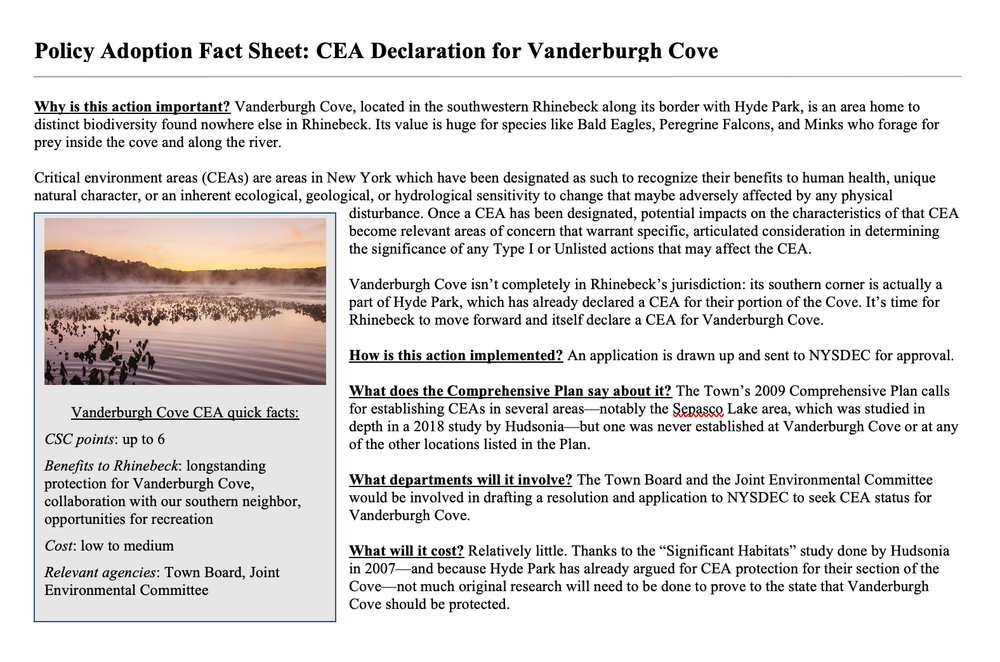
CEA Declaration for Vanderbugh Cove
This recommendation made a case for giving additional protections to one of the most precious and unique habitats in Rhinebeck.
-
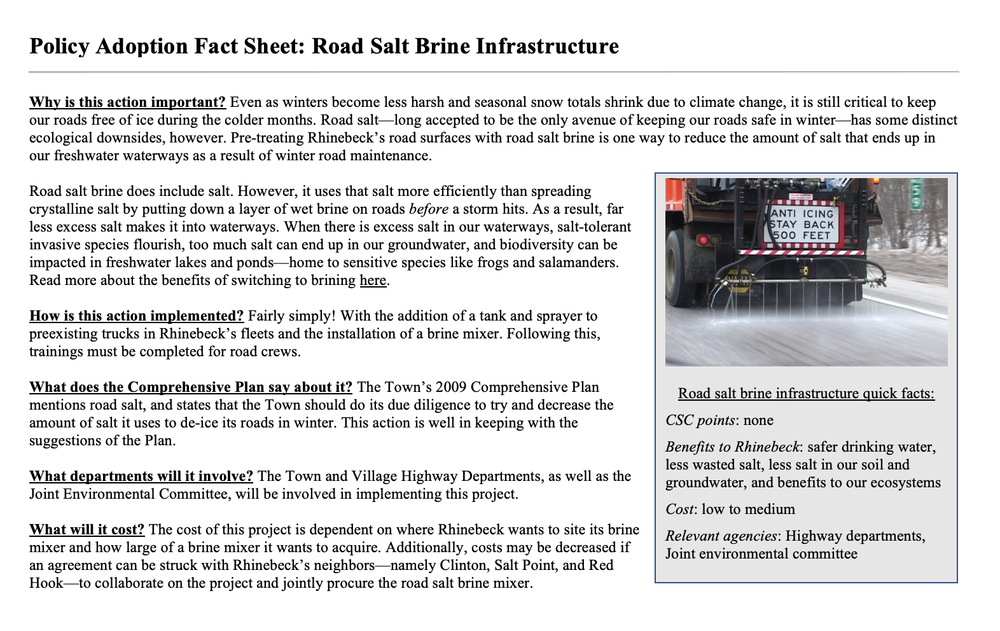
Reducing Road Salt with Brine
At committee member Dan Shapley’s suggestion, we researched using salt brine to reduce the use of road salt. This practice has been put into place by both the Village (see this page for more info) and Town Highway Departments.
-
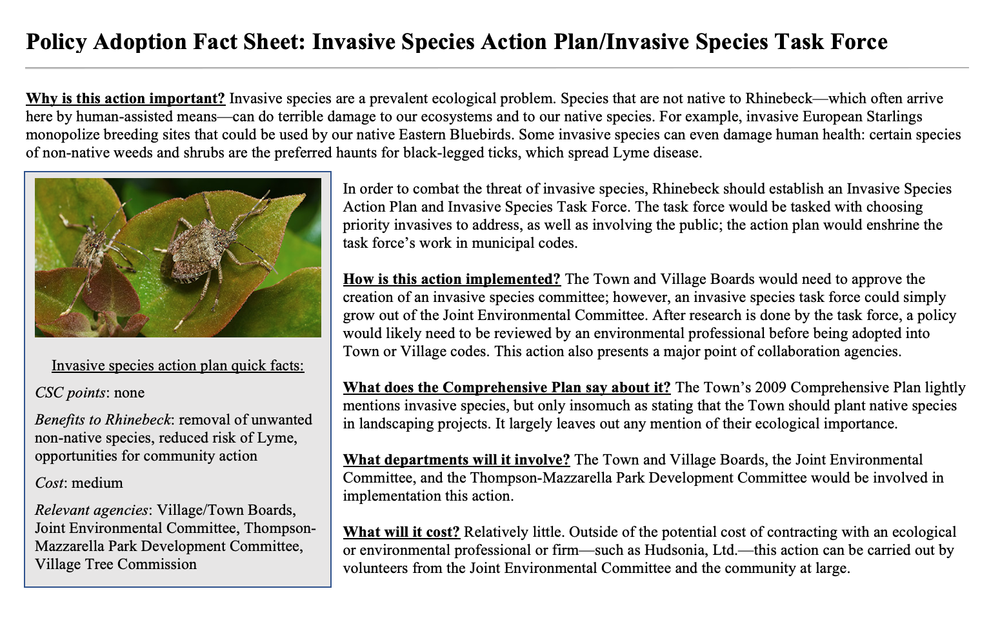
Invasive Species Action Plan
This Fact Sheet recommends actions to address the issue of invasive species. The Village Tree Commission has since published some information on their webpage.
-
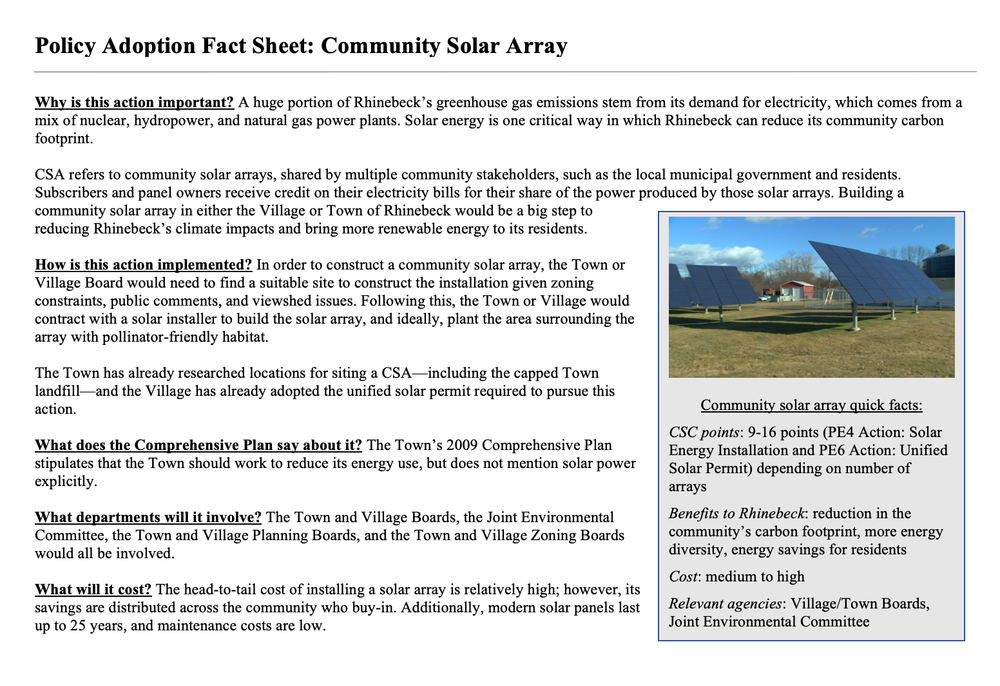
Community Solar Array
This recommendation urges the municipalities to consider ways to support solar farms.
The Town Board is exploring a solar project at the capped landfill.
-
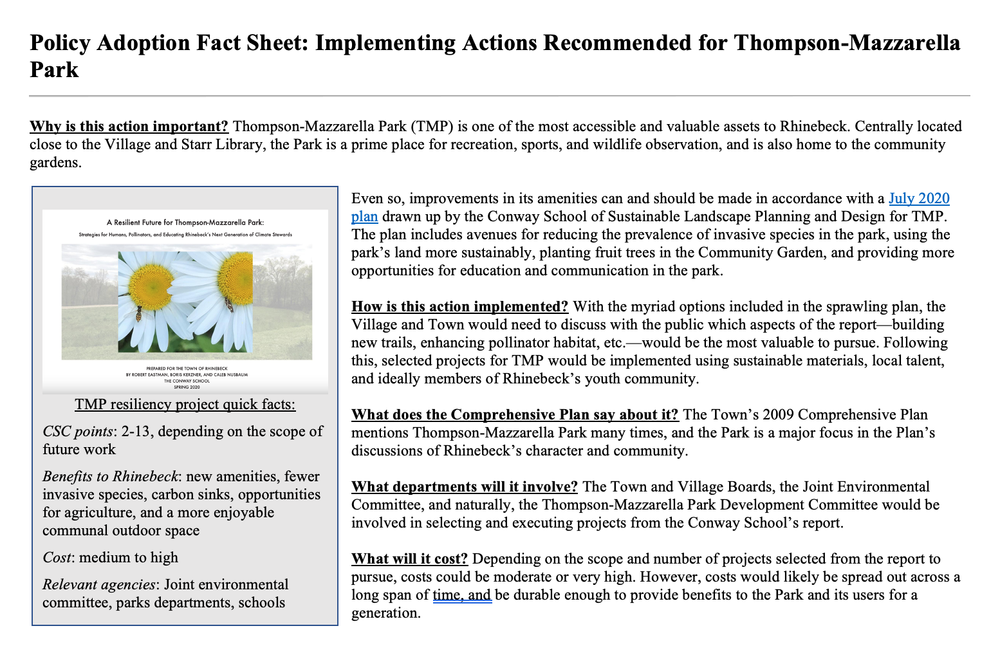
Actions for Thompson-Mazzarella Park
This PDF contains recommendations for how to make the park more climate resilient.
-
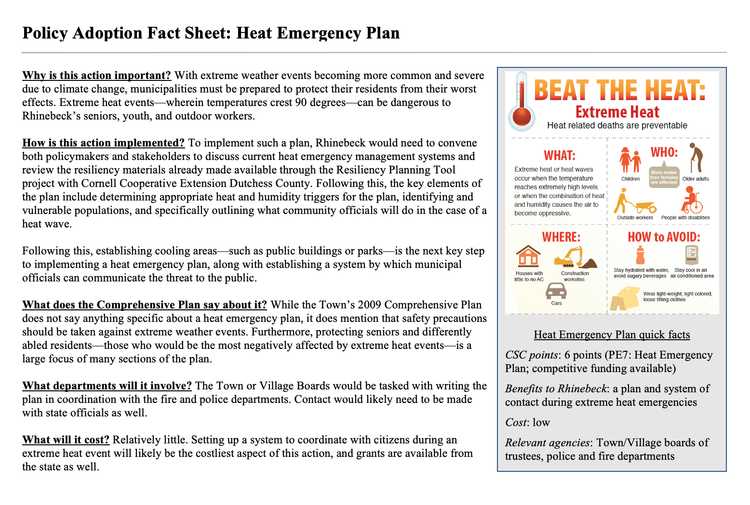
Heat Emergency Plan
Recommendations for how to best plan for heat emergencies. Since its writing, the Village has adopted a Climate Adaptation Plan where heat emergencies are one of the impacts addressed.
-
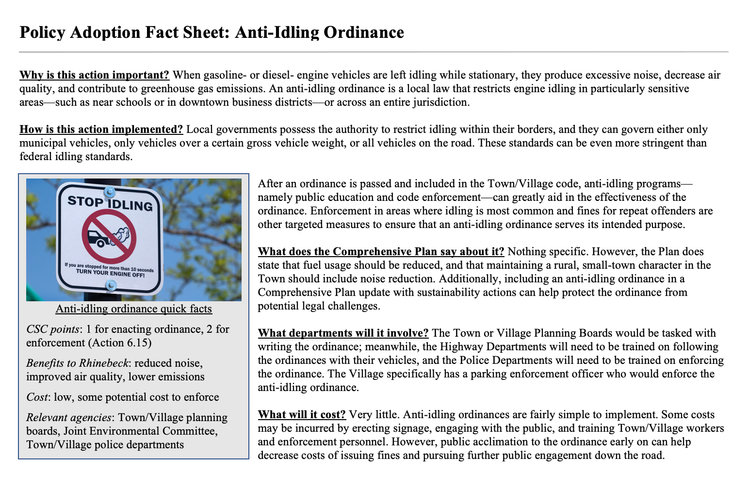
Anti-Idling Ordinance
Considerations for adopting an anti-idling ordinance.
-
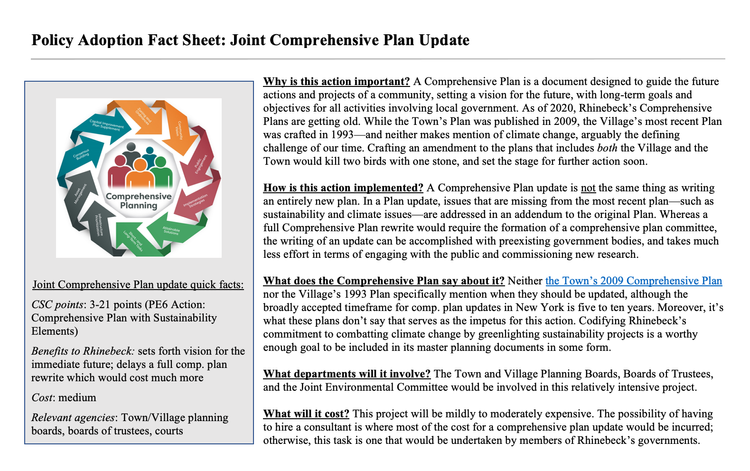
Comprehensive Plan Updates
Since the time of this recommendation the Village Board has adopted a new comprehensive plan in 2024.
-
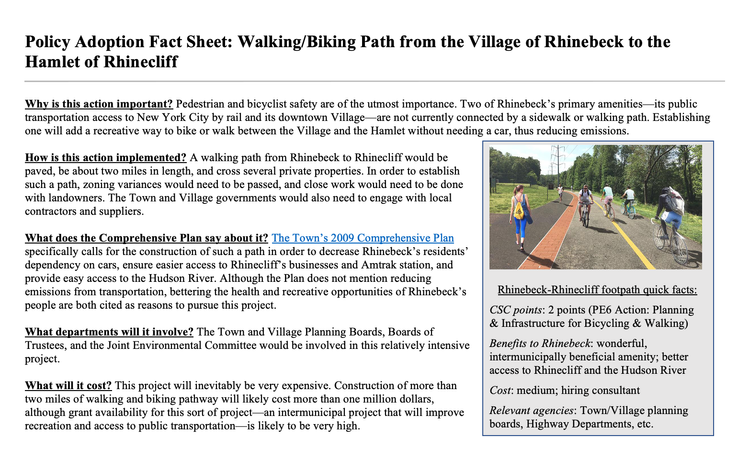
Path to Rhinecliff
This recommendation makes the case for the Town to pursue a path connecting Rhinecliff to the Village.
-
Small-town Municipal Planning for Climate Change in the 2010s: A Review of the Literature on Programs and Policy Pathways
Small towns and villages play small individual roles in the climate conversation, but combined, they can have a sizable impact on emissions totals in the United States. This literature review examines the leading trends in climate policy in small towns and villages—setting forth the precedent that Rhinebeck can look to to support its future actions.
-
Review: The Environmental Goals Set Forth by The Rhinebeck Plan (2009) and Their Results ca. 2020
This review focused on the environmental goals set forth by the Town’s 2009 Comprehensive Plan. It covers areas such as water conservation, agriculture, and invasive species—both what the Comprehensive Plan said about these issues, and what has been done regarding them in the last eleven years.
Project Overview
In summer 2020, the Town and Village received a grant from The New World Foundation to engage David Chernack, a Bard CEP graduate student, for a 6-month paid internship. David was tasked with researching the Rhinebeck Comprehensive Plan (2009), Village Master Plan (1993), and other Rhinebeck policies that relate to the climate and environment.
The goal of this work was to ascertain the degree to which these planning documents address issues ranging from public transportation to invasive species to alternative energy. The goal was not a wholesale redo of the Town or Village’s comprehensive plans. Rather, to look at these documents through the 2020 lens of climate and environmental policy. One of the key takeaways from this research is the fact that climate change was not mentioned once in the entirety of the 2009 Comprehensive Plan or the Village’s Master Plan from 1993. However, this is not totally unexpected—few plans until the mid-2010s recognized climate change and emissions reductions as critical aspects of local government’s work.
David tracked down which environmental recommendations from the comprehensive plans were completed and which were not. Additionally, he looked to neighboring municipalities in the Hudson Valley and the work they’ve done in recent years to reduce emissions, safeguard biodiversity, increase equity, and augment climate resiliency measures.
In addition to this work over the course of six months, David:
Reviewed the latest best environmental/climate practices in similar municipalities
Conducted a series of interviews with environmental and climate officials in neighboring municipalities
Prepared a ranked list of the climate and environmental projects the Town and Village should consider
Suggested sustainability and climate areas that could be added as an addendum to the Town’s 2009 the Comprehensive Plan
Developed a prioritization criteria for evaluating climate-facing projects in Rhinebeck’s future
David hosted a virtual Joint Village/Town Online Special Hearing December 17, at 7pm. Watch the video recording below. You can also access a PDF of his slides.
Prior to this information session, we put the word out for members of the Rhinebeck community to take this short, anonymous survey. Close to 50 people took the survey prior to the session and we decided to leave it open to gather more. Please take the survey: we want to hear what you feel Rhinebeck’s environmental priorities should be moving into 2021.
What is a Comprehensive Plan, and why is it important?
The Village of Rhinebeck and the Town of Rhinebeck each have their own Comprehensive Plans: the Town’s most recent Plan is from 2009 while the Village’s most recent Plan had been from 1993.
A Comprehensive Plan is a complex document designed to guide the actions a community takes towards its future, including its environmental, economic, and cultural goals and aspirations. A Comprehensive Plan presents a set of visions for the medium-term—typically ten to twenty years into the future—including goals and objectives for all aspects local community governance.
A Comprehensive Plan covers aspects of municipal life from public transportation, to economic development, to street tree management, and beyond. According to survey from the New York Department of State, about 70% of New York municipalities have a Comprehensive Plan.
Comprehensive plans use a body of research and community feedback about the place we live to inform a broad set of policy recommendations. From those recommendations, it is the job of the Boards to institute policies. According to NY State Climate Smart Communities recommendations, “A comprehensive plan also provides a vision for how a community wants to grow over a 10- to 20-year period and recommends steps for how to achieve that vision. As part of that vision, the comprehensive planning process offers an opportunity for communities to consider how to balance the three E’s of sustainability: environment, economy, and equity.”
The Town and Village had formed a Joint Environmental Committee (no longer existing) that worked with David. The end result of David’s project is a recommendation to the Town and Village Boards to add an addendum with sustainability elements to the Town Comprehensive Plan and the Village’s Master Plan. Pursuing this has many benefits:
An addendum with sustainability elements nets Rhinebeck some Climate Smart Community points, helping the Village on its path towards silver and the Town on its path towards bronze certification
It addresses the vision and mission of the environmental and climate work that has been done in Rhinebeck in the past decade
It prepares the Town and Village for a fully-fledged update of their Comprehensive Plans at a future date, when the time comes
Vision: a Rhinebeck where the government, committees, and the public are evolving to a more resilient Rhinebeck, both in climate and community, in the most financially prudent way possible.
Mission: to reduce our greenhouse gas emissions, adapt to climate change, and become more socially connected and constructive, making Rhinebeck even more livable and enjoyable.
About David Chernack
David is a graduate of Rhinebeck High School and Brandeis University in Waltham, Massachusetts. He was a second-year graduate student at Bard College’s Center for Environmental Policy when he did this project during his internship. He is an avid birdwatcher, musician, and car enthusiast. As of 2025, he works for Scenic Hudson’s policy team.
